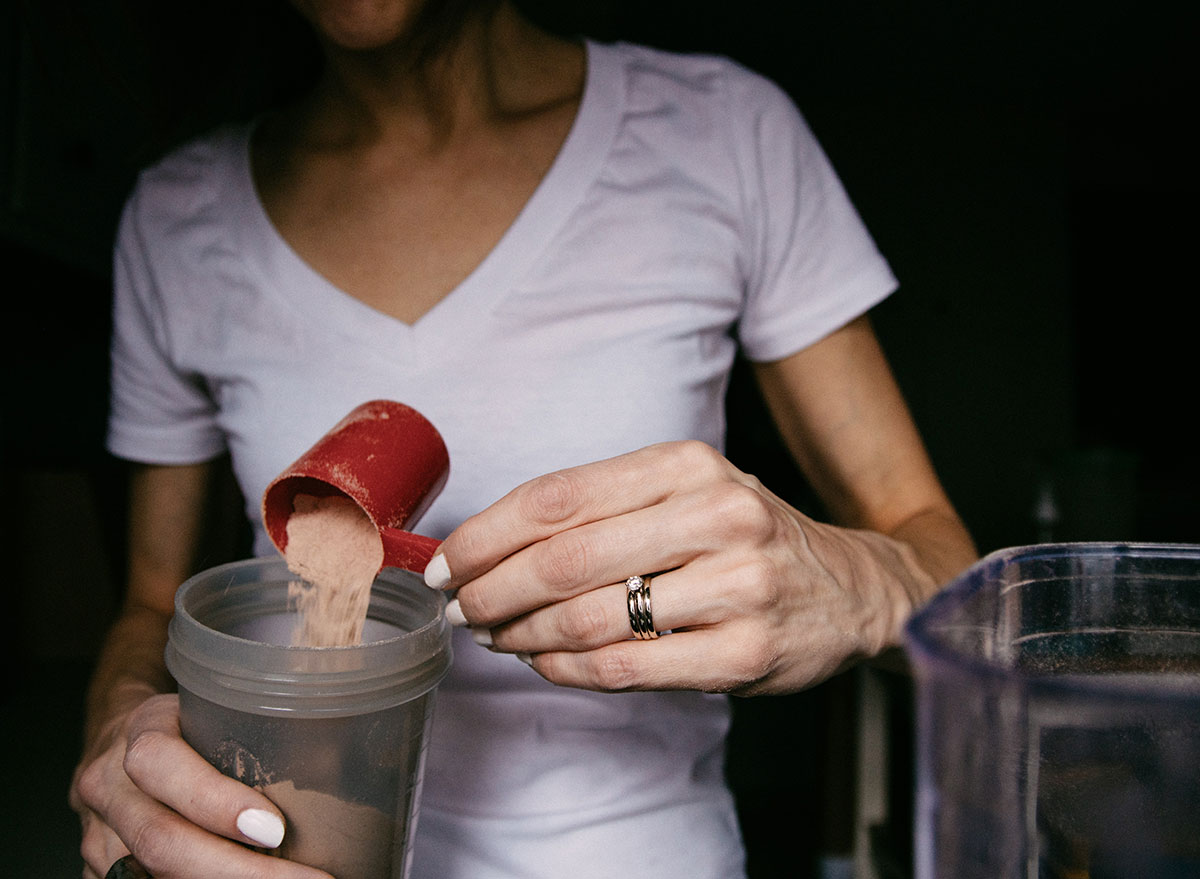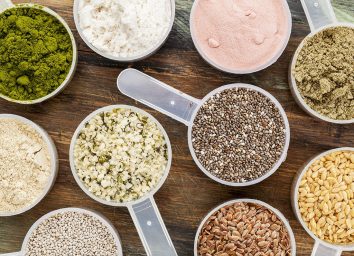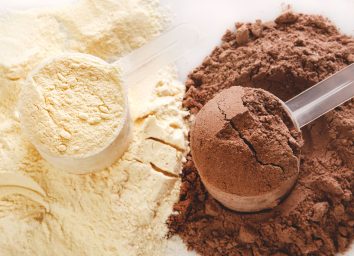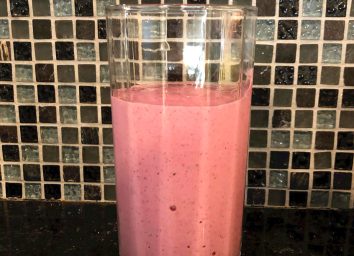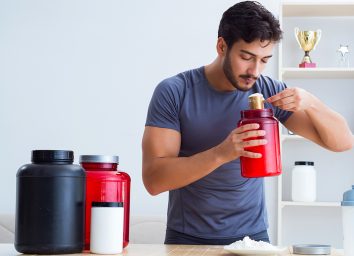The Surprising Truth About Protein Powders You Need To Know
A few weeks ago, F-Factor—the popular high-fiber diet program—was allegedly claimed by several women to have caused major side effects including painful bloating, urinary tract infections, rashes, and even heavy metal poisoning. The controversy surrounding this backlash of F-Factor protein supplements had consumers questioning the level of toxins within the product, and asking F-Factor to release a Certificate of Analysis (CoA). After much debate, F-Factor released their CoA on Aug. 27, which did lay out the level of heavy metals that were found in the product. While this may seem jarring to consumers, it's a reality in many protein powders and supplements that customers should be aware of—not just in F-Factor's products alone.
Heavy metals are found in protein powders due to the soil these plants are growing in. Plant-based protein usually comes from soy and hemp, which relies on soil to grow. This type of plant is prone to absorbing heavy metals due to contaminated soil, pollution, and industrial agriculture. In 2018, the Clean Label Project published a study where they evaluated 134 top-selling protein powder products, stating that 75% of the plant-based protein powders tested positive for heavy metals. Most of the time these protein powders are the ones labeled organic. Organic products had an average of two times more heavy metals in them compared to whey protein powders and non-organic products.
Nevertheless, whey-based products—like F-Factor's—can still have traces of the heavy metals and high levels of toxins. And yet, while the CoA can be helpful for consumers to see and evaluate what's in their protein powders, revealing this kind of information is not required from companies. The surprising truth about protein powders? Companies don't have to reveal to you the level of toxins and chemicals within their products by law. It is not illegal to conceal it.
The proper evaluation of protein powder—and what isn't revealed to the public.
Jaclyn Bowen, MPH, MS, and Executive Director of the Clean Label Project (CLP), is particularly fired up about revealing the truth to consumers about their products. The CLP constantly is testing different products, and recently revealed a study (and lawsuits) regarding paint stripper found in popular decaf coffee manufacturers. After taking a look at F-Factor's CoA herself, she had a few things to share—including the CLP's process, and the side effects of consuming contaminants on the body.
"So many people and brands discount heavy metals, pesticides, and plasticizer contamination," says Bowen. "The regulatory focus of food safety in America is on pathogen and microbiological contaminants—things that will give you vomiting or diarrhea in 24 to 48 hours. However, consumer sentiment is shifting towards the role that food and consumer product safety plays in chronic disease [like] cancers, infertility, etcetera. These diseases don't manifest themselves for years, even decades. There is a growing divide between the court of law and court of public opinion when it comes to the definition of food and consumer product safety. Clean Label Project uses consumer education to pull through industry change and regulatory reform."
One way products are evaluated by law is through California's Proposition 65 (Prop 65). Established in 1986 through the Safe Drinking Water and Toxic Enforcement Act, Prop 65 requires businesses to provide proper warnings to California residents about any significant exposure to chemicals that cause cancer, birth defects, and reproductive harm. The California Office of Environmental Health and Hazard Assessment (OEHHA) oversees the testing and Prop 65 labeling, and protein products—like F-Factor's—will add this warning label to their packaging so consumers are aware.
"Obviously the requirements around Prop 65 relate to each company making its own analysis as to whether or not they are required to have a Prop 65 warning, and then they can make that sort of warning and connection with that," says Christina Tusan, Supervising Deputy City Attorney for the Los Angeles County Consumer and Workplace Protection Unit.
However, while the Prop 65 warning label is required for California, companies are not required to release their full evaluation.
"It's not required, but it's a decision that companies make and something that consumers may want to look at to make their own choices. But it's not legally required thing that people post," says Tusan.
So if a company doesn't have to release their CoA, or even a list of the traces of chemicals and heavy metals in their products, how do you know if a product is safe? Tusan recommends going to third-party sources that test these products for safe consumption (like the CLP), and to take a closer look at U.S. Food and Drug Administration (FDA) reports.
Amy Goodson, MS, RD, CSSD, LD, is a sports dietitian who constantly looks at the types of products that athletes are using. She recommends looking to see if the product is NSF Certified for Sport and Informed Choice, which she considers the gold standards in terms of a third-party testing programs.
"This can help minimize the risk that protein powders and supplements are laced with other ingredients than what is on the label," says Goodson. "While it may not be a 100% guarantee, it is very close and weeds out those supplements at higher risk."
The CLP is also critical about these products, making sure the ones they recommend are truly safe for consumers to use. It's not required for companies to go through the CLP process, but it can be helpful for spotlighting companies that strive for transparency and accountability with their customers. Puori is one of those brands, and the only company that has submitted all of their products for evaluation. Although their products do contain a small amount of heavy metals and toxins, the CLP still recommends it as one of the best protein powders to consume. Puori is part of a very small handful of other companies that are considered clean by the CLP.
Puori may be transparent about what's in their products, but some other companies keep it under wraps. Because numerous companies aren't revealing this information to the public, it can be difficult for consumers to make decisions about protein supplements. Which brings us to the question—is it even worth consuming these products at all?
Are protein powders safe to consume?
According to OEHHA's website, Prop 65 requires businesses to warn consumers if any of the products they use in their homes or in their workplaces contain chemicals—like household products, food, drugs, dyes, or solvents. The list of chemicals is updated at least once a year, and approximately includes 900 chemicals since it was first published in 1987.
What's important to note is how these products are being evaluated. Tusan explains that the Prop 65 analysis is based on the product per usage, not what happens when you consume a lot of that product in one day.
"One may eat several products in a day and conduct an analysis on whether one product is below the Prop 65 limit or slightly above, but they may also be consuming more than the average daily serving amount of the product on that day, or they may be consuming other products with heavy metals that will significantly elevate the total amount of heavy metals they are consuming in a day," says Tusan. "In general, I think each consumer should conduct their own analysis of their diet and what may be in the foods they are eating."
Goodson, as well as Rachel Paul, PhD, RD from CollegeNutritionist.com, recommend first getting protein from high-quality whole food sources before turning to a high consumption of protein powders and products.
"I recommend people who are trying to lose weight or lose body fat, or maintain their weight, try to consume most of their foods from whole foods sources [like] eggs, chicken, meat, fish, and dairy," says Paul. "If a person eats a diet of whole, real foods, and consumes protein from eggs, chicken, meat, fish, or dairy at most meals, they'll likely get the amount of protein they need."
"Ideally, people should strive to get high-quality protein—meaning it contains all the essential amino acids—and that can be done with whole foods as well as beverages like milk," says Goodson.
However, while their recommendation is to find whole-food sources for protein intake, they both do not deny the use of protein powder in one's diet. Like Tusan mentioned, it is about the consumer's choice.
"One of the challenges with protein is that many of them have to be hot or cold like meat, chicken, fish, eggs, and dairy," says Goodson. "Protein powder can be a great way to get protein conveniently as it can be blended into smoothies, mixed into oatmeal, used in recipes as a replacement for half of flour, etcetera. Is protein powder required? No. Can it be a helpful way to get in protein for some people like those on-the-go and exercisers or athletes? Yes."
Protein is important for the body.
"Protein is made from smaller molecules called amino acids," says Paul. "Our bodies can actually produce some amino acids, but many are consumed in the diet—called 'essential amino acids.' Animal protein sources provide all essential amino acids—they're known as 'complete' protein sources. Plant-based foods provide only some of the amino acids we need, they're known as 'incomplete' protein sources."
"[It] is for essential growth and development of muscle and other tissues, helps provide structure, helps maintain proper pH balance and fluid balance, act as chemical messengers that aid communication between your cells, tissues, and organs. Protein also slows down digestion, so it helps get you to get full faster, stay full longer, and maintain stable blood sugar," says Goodson.
On the other hand, getting all of those amino acids—including essential amino acids—can be difficult, especially for someone who isn't consuming any animal protein sources. Tori Simeone, a trainer for Tone It Up (a company that offers a large line of protein products), says that looking for a high-protein supplement can be a way to get those amino acids.
"Your body does not make them on its own so you must get them from the food you eat," says Simeone. "It can be hard to get all of your essential amino acids in every day especially if you are plant-based, so adding in a high-quality protein supplement can be vital."
Although the daily recommended intake (DRI) of protein is 56 grams per day for a man and 46 grams a day for a woman, this can easily be individualized based on activity levels. That's why the use of protein powders became popular, even dating back to the 1950s when bodybuilders were known to consume these types of products and protein supplements soon became normalized.
"As a sports dietitian, it is very useful in helping athletes get protein in quickly after a workout," says Goodson. "Is it the only way to get it? No. But can it be a convenient way to quickly get protein in to help your body get what it needs? Yes."
"Whether you are using whey protein, plant-based protein, casein protein, or others, you should always ask why am I taking this and when am I taking this," says Jordan Mazur, MS, RD for the San Francisco 49ers and Performance Engineer for Momentous. "I always recommend a protein supplement as exactly that, to supplement the diet. If you are on the go and don't have access to real food protein sources…then use protein powder to bridge the gap between meals.
A protein supplement can be part of this, but measuring it out is important. If you have too much of it, you will consume a higher amount of chemicals and toxins then what was recommended and tested through California Prop 65, or even sometimes the FDA and third-party sources.
Be a critic of what you consume.
Part of Tusan's work, as well as the FDA, is facing numerous cases of mislabeling and false advertising. In many cases, the label doesn't always tell you what the product accurately provides.
"You may have one protein that says it doesn't have a particular chemical or metal but in fact testing does show that it does," says Tusan. "So although it is not on a dangerous level, that can sometimes be concerning, so we look and evaluate those cases and we'll move forward where appropriate. But I think that's something for consumers to be aware of is what are the claims they are making and what is the data beyond that."
When picking a product, Bowen has a few recommendations to keep in mind. The first is to make a whey-based protein, preferably vanilla because chocolate is considered to be the most contaminated product. She also says 50% of protein powders tested through the CLP had levels of Bisphenol A (BPA) due to the plastic packaging—which studies show can be dangerous in terms of bodily processes due to estrogen receptors like growth, cell repair, fetal development, energy levels, and reproduction.
It's important to look through those third-party sources and evaluate, like the CLP, and keep a close eye on what the FDA reports. If a company isn't as transparent about their products, be a harsh critic of what you're consuming. Ask yourself if you are comfortable consuming something that you aren't 100% sure what's in it.
Instead, add whole-food sources of protein to your meals like these 19 High Protein Breakfasts That Keep You Full.
